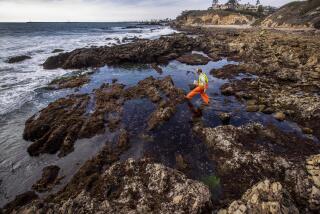Workplace Safety Lapses Alleged in Brazilian Oil Rig Accident
- Share via
SAO PAULO, Brazil — Union leaders and government officials accused Brazil’s national oil company Friday of failing to take precautions that could have prevented an accident that killed up to 10 workers and crippled one of the world’s largest offshore oil platforms.
Three explosions devastated the 40-story platform in the Roncador oil field in the Atlantic Ocean about 80 miles from the coast and 120 miles northeast of Rio de Janeiro on Thursday. It is unclear what caused the explosions. The accident left the colossal structure, which was commissioned just last year, leaning at a precarious angle and threatened to cause an oil spill.
Officials of Petrobras, the giant state oil company, said Friday that the structure was likely to sink within two days and that emergency response teams in boats and helicopters were ready to mitigate a possible spill. Experts said such a spill probably would not significantly damage the environment.
Only one death has been confirmed, and one worker was hospitalized with severe burns. But nine missing workers are presumed dead, making Thursday’s accident apparently the worst of its type in Brazil since 36 people died in a fire at a Petrobras platform in 1984.
The accident further damaged the image of Petrobras only months after a spill caused environmental damage in southern Brazil. The latest problem was expected to cause operating losses of hundreds of millions of dollars.
Oil workers staged protests across Brazil on Friday. Union leaders allege that aggressive cost-cutting and the use of inexperienced contract workers have resulted in 82 deaths nationwide at company facilities during the past three years. Sixty-six of the victims were contract workers, according to union statistics.
There were 47 accidents and nine deaths in the Rio area last year, according to Arialdo Diz Feydiz, director of the oil workers union in the region.
“We have made various allegations of irregularities, and a big investigation was already underway by the prosecutor’s office,” Diz said. “For every worker, we have seven or eight contract workers who don’t have the necessary training or qualifications. . . . The policy of the big companies to reduce operational costs makes platforms more vulnerable to accidents.”
News reports Friday said federal prosecutors who enforce job safety regulations alleged that the accident could have been prevented if the company had complied with judicial orders to create safety commissions at all its platforms.
But the company’s manager for security and environmental issues, Irani Varella, said Petrobras officials do not believe that safety problems were to blame.
And Petrobras denied allegations that the use of temporary contract workers played any role.
“There is no indication that outsourcing of services at platform P-36 had any relation to the three explosions that occurred,” said Petrobras President Henri Philippe Reichstul.
There were 175 employees on the Italian-made platform at the time of the explosions. The rig, which accounted for about 5% of the nation’s daily oil production, was producing 80,000 barrels a day and was expected to reach a target of 180,000 barrels daily at full capacity.
After a 50-year monopoly by Petrobras, Brazil’s oil industry has opened to private and foreign companies in recent years, and the state oil giant has entered into joint ventures.
Like other state-run enterprises in Latin America, Petrobras has been modernizing and streamlining operations, cutting its payroll from 70,000 to 30,000 during the past seven years. The company racked up record earnings last year, but the opening of the market worries unions and other critics.
“This is very bad for the company’s image,” said Luiz Pingelli Rosa, an expert on energy issues at Rio’s Federal University. “The long-term impact will depend partly on what is determined to be the cause. Whether there was an error, whether this was a badly constructed project, all of those factors will have an influence.”
There was no spillage yet Friday. The size of a potential spill depends on whether and when the platform sinks. About half of the approximately 400,000 gallons of fuel stored on the structure could spill, and some experts say there is a chance that the platform could damage oil wells beneath the surface.
Petrobras officials said the undersea oil and gas wells have been sealed. Experts did not anticipate an ecological calamity.
“The damage will not be very grave because of the distance from the coast,” Pingelli said.
Environmental activists agreed.
“The weather conditions are good, and the sea is calm,” said Delcio Rodrigues of Greenpeace Brazil. “If weather conditions remain good, the environmental risk of the spill is minimal. The company has the conditions to pump out the oil. If there are changes in weather, conditions could be different, and a spill would hurt the coastal mangroves.”
The rig in the Campos Basin, which accounts for about three-fourths of Brazil’s domestic oil production, was the world’s largest in terms of production capacity when it was commissioned last year, according to oil journalist George Hawrylyshyn. Since then, a Norwegian company has begun operations at a larger platform, he said.
*
Paula Gobbi in The Times’ Rio de Janeiro Bureau contributed to this report.
More to Read
Sign up for Essential California
The most important California stories and recommendations in your inbox every morning.
You may occasionally receive promotional content from the Los Angeles Times.












